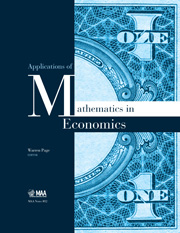Book contents
- Frontmatter
- Contents
- Preface
- Notes on the Sections
- Problems and Subject Areas
- 1 Microeconomics
- 2 Scenarios Involving Marginal Analysis
- 3 Intermediate Macroeconomics Theory
- 4 Closed Linear Systems
- 5 Mathematics in Behavioral Economics
- 6 Econometrics
- 7 The Portfolio Problem
- 8 Topics in Modern Finance
- 9 Maximizing Profit with Production Constraints
- About the Editor
- About the Authors
6 - Econometrics
- Frontmatter
- Contents
- Preface
- Notes on the Sections
- Problems and Subject Areas
- 1 Microeconomics
- 2 Scenarios Involving Marginal Analysis
- 3 Intermediate Macroeconomics Theory
- 4 Closed Linear Systems
- 5 Mathematics in Behavioral Economics
- 6 Econometrics
- 7 The Portfolio Problem
- 8 Topics in Modern Finance
- 9 Maximizing Profit with Production Constraints
- About the Editor
- About the Authors
Summary
Introduction
Ragnar Frisch, 1969 recipient of the Nobel Prize in Economic Sciences, stated that econometrics is “the unification of economic theory, statistics and mathematics.” [2] Economic theory starts with a set of assumptions and produces a series of qualitative statements or hypotheses. Economists use data that are different from the data used in most mathematical statistics courses. These data are not usually generated by a controlled experiment. For example, economists are not able to change a tax rate to see how people respond, and then make policy recommendations. Instead they use past responses to changes in tax rates to estimate what the response will be in the current period. Because the economic situation is not precisely the same as in the past, and people may not respond in the same way, there is typically greater variance in economic data. There may also be measurement error due to data collection methods. So econometricians have developed statistical methods specifically to accommodate economic data. Econometrics provides the tools for estimating economic relationships, for testing economic theory, and for forecasting.
A typical undergraduate econometrics course starts with an explanation of the assumptions and the development of the simple least-squares regression model (the classical model). The course proceeds to multiple regression, hypothesis testing within the model, and discussions of selecting independent variables and the appropriate functional form. It continues with focus on the identification and implications of the violations of the classical assumptions: multicollinearity, autocorrelation, and heteroscedasticity.
- Type
- Chapter
- Information
- Applications of Mathematics in Economics , pp. 75 - 90Publisher: Mathematical Association of AmericaPrint publication year: 2013



